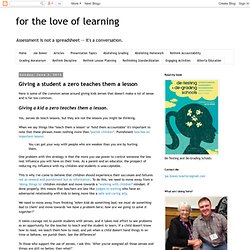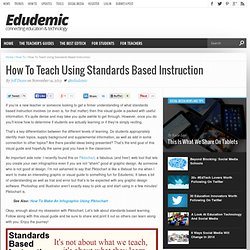

Education Week. Language matters.

It's that simple. What we say and how we say it has a big impact on how students and other stakeholders respond to our choices. Students are always waiting for a variety of cues from their teachers and peers to determine what and how much they are learning. So rather than perpetuate the issues around grading by using the same language we've always used, it's time to be deliberate in the shift as we change our assessment practices. Getting rid of grades is a big and challenging step to make, but it can be done and even if you aren't ready to go all in, there are ways to adjust small things in the classroom that will lead to important growth for students. Start with the words you use when communicating learning. Look at the below chart from Hacking Assessment: The traditional grading language is passive and judgmental and subconsciously by using this language, we are putting the focus on the wrong things.
"What grade did I get? " Think about the words you use in class. What Does it REALLY Mean to Do Standards-Based Grading? This blog originally ran on CompetencyWorks.

I read a lot of clips about how districts are advancing competency education around the country, and it always seems to me that when there are any negative reactions they are in response to new grading practices, usually referred to as standards-based grading. It strikes me that negative reactions pop up when districts either use grading as an entry point (which puts all the focus on the grading and not on why competency education is valuable) or they’ve put some of the pieces of standards-based grading in place but not the entire framework necessary to make it more trustworthy than traditional grading.
How does a district implement high quality standards-based grading, and when is the right time? I’ll do the best I can to synthesize what I’ve been learning from districts, but please do not hesitate to disagree or add more nuance to these thoughts. What is the difference between standards-referenced and standards-based grading? 1. 2. Giving a student a zero teaches them a lesson. Here is some of the common sense around giving kids zeroes that doesn't make a lot of sense and is far too common.

Giving a kid a zero teaches them a lesson. Yes, zeroes do teach lessons, but they are not the lessons you might be thinking. You can get your way with people who are weaker than you are by hurting them. One problem with this strategy is that the more you use power to control someone the less real influence you will have on their lives. As a parent and an educator, the prospect of reducing my influence with my children and students is unacceptable.
This is why I've come to believe that children should experience their successes and failures not as reward and punishment but as information. We need to move away from thinking "when kids do something bad, we must do something bad to them" and move towards "we have a problem here; how are we going to solve it together? " Zeroes motivate kids. Yes, zeroes motivate kids -- they motivate them to quit. Let me explain. Standards Referenced/based grading. Changing the Conversation: Grades vs. Learning - Work in Progress. Expecting Excellence:Seven Reasons for Standards-Based Grading. How To Teach Using Standards Based Instruction. If you’re a new teacher or someone looking to get a firmer understanding of what standards based instruction involves (or even is, for that matter) then this visual guide is packed with useful information.

It’s quite dense and may take you quite awhile to get through. However, once you do you’ll know how to determine if students are actually learning or if they’re simply reciting. That’s a key differentiation between the different levels of learning. Do students appropriately identify main topics, supply background and supplemental information, as well as add in some connection to other topics? Are there parallel ideas being presented? An important side note: I recently found this on Piktochart, a fabulous (and free!) See Also: How To Make An Infographic Using Piktochart Okay, enough about my obsession with Piktochart. RESP3CTtheGAME : Inspired by #sbgchat I created... MicheleCorbat: Love this visual on "Shifts...